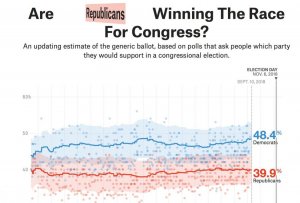Politikk, religion og samfunn President Donald J. Trump - Quo vadis? (Del 1)
Diskusjonstråd Se tråd i gallerivisning
-
- Status
- Stengt for ytterligere svar.
Apropos Trump & lov & rett & sånt: Det begynner å bli påfallende hvordan de enkeltpersonene i FBI og justisdepartementet som han fokuserer sin vrede på er etterforskere med hvitvasking av russiske mafiapenger som spesialitet.
Trump’s Top Targets in the Russia Probe Are Experts in Organized Crime
“How the hell is Bruce Ohr still employed at the Justice Department?” Trump wrote on Thursday. “Disgraceful! Witch Hunt!”
Trump’s fixation with seeing Ohr ousted from the Justice Department could be perceived as yet another attempt to undermine the credibility of the people who have investigated him. It could also be interpreted as an attack on someone with deep knowledge of the shady characters Trump and his cohort have been linked to, including Semion Mogilevich, the Russian mob boss, and Oleg Deripaska, a Russian aluminum magnate close to Putin who did business with Trump’s former campaign chairman Paul Manafort. (Incidentally, another Manafort associate, the Ukrainian billionaire Dmitry Firtash, admitted that he only managed to be in business because Mogilevich allowed him to be, according to a leaked 2008 State Department cable.) Ohr was involved in banning Deripaska from the U.S. in 2006, due to his alleged ties to organized crime and fear that he would try to launder money into American real estate. Nearly a decade later, Ohr and the FBI sought Deripaska’s help in taking down overseas criminal syndicates.
The Urgent Question of Trump and Money LaunderingIt is ironic, then, that Trump’s attacks have shone a bright light on the experts inside and outside the government who have been investigating him—individuals who share a deep expertise in organized crime, money laundering, fraud, and racketeering.
Hvorfor det, mon tro?It just so happens that most of the once-obscure bureaucrats whom Trump has tried to discredit also are experts in some combination of Russia, organized crime and money laundering.Ja, klart det. Jeg ser også at John Bolton er tilbake og nærmer seg gamle høyder i sin respekt for internasjonal lov og rett. Denne gangen er det den internasjonale straffedomstolen for krigsforbrytelser i Haag som får unngjelde. Igjen, akkurat som under GWBush:
https://www.nytimes.com/2018/09/10/us/politics/trump-plo-bolton-international-criminal-court.html
Hmmm, å bruke det amerikanske rettsapparatet til politisk gjengjeldelse mot dommere i Haag hvis de er så formastelige å ta opp en sak som gjelder krigsforbrytelser utført av amerikanske soldater - det lukter ikke helt godt for meg. Denne administrasjonen er sanne venner av en upartisk rettsstat basert på lover og regler og likebehandling for loven, ja. Lock her up!WASHINGTON — The Trump administration threatened the International Criminal Court with sanctions if it pursued an investigation of American troops in Afghanistan, opening a harsh new attack on an old nemesis of many on the political right.
“The United States will use any means necessary to protect our citizens and those of our allies from unjust prosecution by this illegitimate court,” President Trump’s national security adviser, John R. Bolton, said in a speech on Monday in Washington.
“We will ban its judges and prosecutors from entering the United States,” Mr. Bolton said. “We will sanction their funds in the U.S. financial system, and, we will prosecute them in the U.S. criminal system. We will do the same for any company or state that assists in an I.C.C. investigation of Americans.”
Mr. Bolton also announced that the United States would shut down the Palestine Liberation Organization’s office in Washington — a decision linked to the International Criminal Court, which he said was being prodded by the Palestinians to investigate Israel.
Mr. Bolton’s hostile words, in what the White House has called his first major address as national security adviser, echoed the position he took as a senior official in the George W. Bush administration, when Mr. Bolton emerged as the most virulent foe of the court, which is based in The Hague.Sist redigert:HHardingfele
Gjest
Dette innførte amerikanerne i 2002, etter at de hadde bestemt seg for å angripe Irak. De visste at det ville være i strid med Folkeretten og ønsket derfor å sikre seg. Det ble orientert om at eventuelle amerikanske administrasjonsmedlemmer eller militære som ble tauet inn for Haag ville bli frigjort med ethvert disponibelt middel.
https://en.wikipedia.org/wiki/American_Service-Members'_Protection_ActHHardingfele
Gjest
Mannen er stokk dum, men har fått en plattform der han får spre dumskapen sin. Her er Trump om forskjellen mellom kull og vindmøller. Man må se det for å tro det.
www.facebook.com/NowThisPolitics/videos/565197413909770/Det er nesten som man tror en look-alike komiker prøver å drite ut president Trump.
Men det er jo den enfoldige velgermassen som er det største problemet.Ccruiser
Gjest
Nesten like gøy som den NC saken for et par år siden..
"Woodlander Bobby Mann worried that solar panels "would suck up all the energy from the sun and businesses would not come to Woodland."Den enfoldige velgermassen er neppe det største problemet i mine øyne; mangel på alternativer, derimot.
Men de vil nok presse seg frem, får en håpe.
https://www.hifisentralen.no/forumet/off-topic-hja-rnet/81490-a-38.html#post2784232
og etterfølgende post
Tror du er inne på noe vesentlig her...Den enfoldige velgermassen er neppe det største problemet i mine øyne; mangel på alternativer, derimot.
Hvem er tøff nok til å gå opp mot Trump og hans blinde disipler nå? Vedkommende kommer til å få livet snudd opp ned og med historikken til Trump så er det ikke bare halvsannhetene som vil komme frem, det kommer til å lyves og trues på et nivå vi ikke har sett. Er stygt redd for fortsettelsen nå og jeg tror de som veddet en femmer kommer til å beholde den og at de godt kan vedde om de neste 4 årene også.Jeg føler meg ikke like trygg på valgresultatet for neste runde, men at Trump blir sittende ut perioden sin anser jeg som sikkert, og har ansett som sikkert siden jeg inngikk det ambisiøse veddemålet med Fela.
Grunnen til at jeg ikke føler meg like sikker på neste valgrunde er at nå har opposisjonen en grunn til å faktisk gjøre en innsats, og velgermassene har sett hva som skjer når de ikke gidder å stemme.
Grunnfjellet til Trump stemte allerede på han i første omgang. Inkludert mange som ellers ikke pleide å stemme. Disse vil nok stemme på nytt ved neste valg. Men klarer man å rekruttere enda flere til dette grunnfjellet? Det tviler jeg på.
På den andre siden har man både muligheter for bedre republikanske kandidater som man heller vi ha frem, men akkurat det anser jeg som lite trolig at vil bli noe av.
Det blir heller at demokratene enten klarer å finne en bedre kandidat som folk faktisk vil stemme på, og/eller at folket forstår at de må stemme selv om de ikke er kjempegira, for å unngå at de går i fella som sist da de ble sittende hjemme fordi de ikke gadd stå i kø for Clintons skyld.
Akkurat dette gjør at jeg tror andre valgseier for Trump vil bli betydelig verre enn den første. Så derfor kommer jeg nok ikke til å satse store penger på det. Men jeg vil ikke bli overrasket om han vinner en periode til, forutsatt at jeg ikke i forkant har tapt femmern min til Fela.
Velger man sirkus får man klovn.Den enfoldige velgermassen er neppe det største problemet i mine øyne; mangel på alternativer, derimot.
Men de vil nok presse seg frem, får en håpe.
https://www.hifisentralen.no/forumet/off-topic-hja-rnet/81490-a-38.html#post2784232
og etterfølgende postHHardingfele
Gjest
Den femmer'n er allerede blitt investert, Anders, den beholder du ikke.Jeg føler meg ikke like trygg på valgresultatet for neste runde, men at Trump blir sittende ut perioden sin anser jeg som sikkert, og har ansett som sikkert siden jeg inngikk det ambisiøse veddemålet med Fela.
Grunnen til at jeg ikke føler meg like sikker på neste valgrunde er at nå har opposisjonen en grunn til å faktisk gjøre en innsats, og velgermassene har sett hva som skjer når de ikke gidder å stemme.
Grunnfjellet til Trump stemte allerede på han i første omgang. Inkludert mange som ellers ikke pleide å stemme. Disse vil nok stemme på nytt ved neste valg. Men klarer man å rekruttere enda flere til dette grunnfjellet? Det tviler jeg på.
På den andre siden har man både muligheter for bedre republikanske kandidater som man heller vi ha frem, men akkurat det anser jeg som lite trolig at vil bli noe av.
Det blir heller at demokratene enten klarer å finne en bedre kandidat som folk faktisk vil stemme på, og/eller at folket forstår at de må stemme selv om de ikke er kjempegira, for å unngå at de går i fella som sist da de ble sittende hjemme fordi de ikke gadd stå i kø for Clintons skyld.
Akkurat dette gjør at jeg tror andre valgseier for Trump vil bli betydelig verre enn den første. Så derfor kommer jeg nok ikke til å satse store penger på det. Men jeg vil ikke bli overrasket om han vinner en periode til, forutsatt at jeg ikke i forkant har tapt femmern min til Fela.
Trump er ekstraordinært upopulær i USA. Dersom man trodde at amerikansk økonomi er hva som skjer på Wall Street skulle Trump vært utrolig populær, med godt over 50% godkjent. Han vaker under det nivået fordi amerikanere ser et utrolig kaos fra Washington D.C. Det er kun grunnfjellet hans som han appellerer til og dette vokser ikke, det avmattes. Jeg følger Rasmussen, den mest pro-republikanske meningsmåleren, og selv der sliter Trump. Han avkler seg selv hver eneste dag.
Det som foregår nå burde egentlig beskrives i langt større detalj, siden det er så dramatisk. Selve maktfordelingprinsippet står på spill dersom man avsetter presidenten uten bunnsolid grunnlag -- spesielt fordi Trump, i motsetning til Nixon, er uten skam. Nixon gikk av da han innså hvor det bar mens Trump vil bite seg fast til siste øyeblikk.
Her har du en god indikasjon på hva som foregår bak kulissene: Ryan og McConnell ringte og gratulerte bedriftslederne som trakk seg fra Trumps næringslivsråd etter Trumps støtte til ekstremistene i Charlottesville.
http://thehill.com/homenews/house/4...eos-after-they-left-trump-councils-because-of
Trump har ikke "coat-tails", dvs evne til å dra kandidater inn i Kongressen og delstatsforsamlingene. Selv om man har lært å være skeptisk til meningsmålinger er de ganske entydige: GOP er på vei mot et nederlag i mellomvalget, der de vil miste guvernørposter, ligger an til å miste flertallet i Representantenes hus og sannsynligvis akkurat klarer å beholde flertallet i Senatet (fordi det er relativt sett færre republikanske seter på spill).
I tillegg er demokratene i ferd med å bli radikalisert i forhold til sin sedvanlige linje som er til høyre for norske Høyre, det vil også ha effekt.
Uavhengig av hva som skjer i mellomvalget ser republikanerne at de er i ferd med å brenne ned partiet med sin ekstremisme -- strategier som gerrymandering fungerer når det er små prosentbevegelser fra valg til valg, ikke når det går valgskred.
Nå går det på hvor mye som skal få tilflyte offentligheten av beveggrunnene bak maktspillet. Nixon holdt det gående lenger enn hva Trump har gjort hittil, før han måtte kaste kortene; "alle" visste at noe var galt med Reagan, men at han var sterkt rammet av Alzheimer forble en hemmelighet til etter hans avgang.
At USA skal holde seg med Trump som president i ytterligere 862 dager, med tweetstormer, rabiat golfing, utskjelling av allierte, ødeleggelse av traktater og kaos for republikanerne er ikke realistisk. Men det blir litt av en reise ...
Enig. Det er urealistisk.At USA skal holde seg med Trump som president i ytterligere 862 dager, med tweetstormer, rabiat golfing, utskjelling av allierte, ødeleggelse av traktater og kaos for republikanerne er ikke realistisk. Men det blir litt av en reise ...
Men det som faktisk skjer er på ingen måte realistisk det heller. Det hele er så absurd at selv de sykeste og mest irrasjonelle drømmene jeg noensinne har hatt ikke klarer å måle seg med denne utgaven av virkeligheten.
Det er dette som får meg til å føle meg sikker på at den femmern min aldri vil finne frem til deg. For som du sier, det skal enormt mye til for å avsette en sittende president når han ikke er enig i at han har gjort noe galt, at jeg rett og slett ikke tror det vil skje.
Du får heller skaffe deg en fin nedtellingskalender som sier "slapp av, det er bare 862 dager igjen"
For den VIL faktisk gå helt til null før du kan puste lettet ut. Eller, forhåpentligvis. Hva som skjer etter det tør jeg ikke gjette på engang.
https://www.timeanddate.com/countdo...sg=Time+left+until+Trump+leaves+office&p0=263- Ble medlem
- 10.10.2008
- Innlegg
- 5.786
- Antall liker
- 1.646
Når jeg leser denne blir jeg ikke voldsomt sikker på at demokratene får flertallet i senatet i løpet av 2018. Og uten det tror jeg Trump sitter perioden ut. Approval-ratingen hans i de statene som er valgt ut i denne artikkelen er også overraskende høye sett med mine naive øyne.
Femmeren til Anders hadde jeg dermed ikke investert i hvitløksfedd eller whisky var jeg hardingfela. Dessverre.
https://www.vox.com/policy-and-politics/2018/9/3/17800588/2018-midterm-elections-senateHHardingfele
Gjest
At demokratene skal ta Senatet er usannsynlig. I denne valgrunden er det flere demokratiske seter oppe til valg enn republikanske. Men Representantenes hus er i spill og mellomvalget blir en sannhetsprøve på om Trumps virkelighetsbeskrivelse er hva som gjelder eller om virkeligheten får innpass i GOP-ledelsens vurderinger. Som jeg skriver over ligger republikanerne an til å beholde flertallet i Senatet.
Men Articles of Impeachment mot Nixon ble forfattet i Representantenes hus og til slutt skjønte et republikansk Senat dengang at denne presidenten var det bare å kvitte seg med. Da Nixon fikk beskjed om at Senatet ville støtte kravet om riksrett valgte han å gå av før det ble reist.
Så får vi se hvor mye som har endret seg siden dengang. De som gikk i fengsel pga Watergate hadde bare forsøkt å dekke over et tåpelig innbrud hos demokratene, de hadde ikke samarbeidet med en fremmed makt som har hydrogenbomber rettet mot USA.
Nope, kan ikke se hvem det skulle være.Ikke at jeg følger ekstremt godt med på hva som skjer over dammen, men er det noen som kan utfordre Trump per dags dato?
Og det er, som dr.Dong har påpekt flerfoldige ganger, den største bekymringen.HHardingfele
Gjest
Ikke at jeg følger ekstremt godt med på hva som skjer over dammen, men er det noen som kan utfordre Trump per dags dato?
En krakk. Han er historisk upopulær og lite tyder på at det vil snu. Selv hans tilhengere ber ham prøve å arbeide mer og ståke mindre.
https://projects.fivethirtyeight.com/congress-generic-ballot-polls/
Mellomvalget vil gi en god pekepinn på hvor stor panikk GOP bør kjenne.
Fra 538.
 H
HHardingfele
Gjest
Ikke et krakk. En krakk kan slå Trump om han stiller i 2020.
Bacevich om «it’s effectively over» når det gjelder Trumps presidentgjerning.
Tomgram: Andrew Bacevich, The President as Pimple | TomDispatch
Donald Trump’s tenure as the 45thU.S. president may last another few weeks, another year, or another 16 months. However unsettling the prospect, the leaky vessel that is the S.S. Trump might even manage to stay afloat for a second term. Nonetheless, recent headline-making revelations suggest that, like some derelict ship that's gone aground, the Trump presidency may already have effectively run its course. What, then, does this bizarre episode in American history signify?
Let me state my own view bluntly: forget the atmospherics. Despite the lies, insults, name calling, and dog whistles, almost nothing of substance has changed. Nor will it.- Ble medlem
- 28.09.2016
- Innlegg
- 13.170
- Antall liker
- 14.849
Bernt Hagtvedt (professor i internasjonale studier) diskuterer fascisme generelt i Verdibørsen, og i den forbindelse er han også innom Trump. Han er tydelig på at Trump ikke er en fascist, i det minste. Men han er eksplisitt på at Donald Trump er den første anti-demokratiske, amerikanske president. Bare det er et lovlig sterkt utsagn.
Men så vil vel tilhengerne sikkert ha det til at også Hagtvedt kun er en ekkel propagandist.
DisqutabelHHardingfele
Gjest
Man skal ikke bort fra effekten av en terroraksjon eller krig, wag the dog style. Men er Trump den man ønsker landet ledes av da? Naturligvis en fordel at Den største feltherre noensinne vil kunne kommandere troppene via Twitter.CCyber
Gjest
Vedlegg
-
328.6 KB Visninger: 287
- Ble medlem
- 28.09.2016
- Innlegg
- 13.170
- Antall liker
- 14.849
^ Det verste med sånne innlegg som dette, er jo at man f... ikke vet hva som sant mer! Det er så sprette gale at han faktisk kunne funnet på noe sånt.
For øvrig er han nå i ferd med å innføre sanksjoner mot nasjoner som blander seg i valget:
https://www.aftenposten.no/verden/i/dd1L0O/Reuters-Trump-vil-sla-ned-pa-valginnblanding
Man vil kunne anta at dette skal være en slags respons på russiske fiksfakserier i presidentvalget, men magefølelsen forteller meg at det er noe annet han er ute etter. Så dypt har jeg sunket, jeg ser spøkelser på høylys dag. No thanks to Trump.
DisqutabelAnmeldelse av Woodwards bok
Sein Buch besäuft sich, anders als das von Manigault-Newman, an Washingtons Selbstbeweihräucherung. Er will so unbedingt wichtig und seriös sein, dass er in einer Lawine von Bullshit erstickt.
https://www.zeit.de/kultur/literatur/2018-09/bob-woodward-fear-donald-trump-usa-buch/komplettansicht- Ble medlem
- 10.10.2008
- Innlegg
- 5.786
- Antall liker
- 1.646
Frisk opp tysken min er de snill, Herr Dong. Er det Woodward eller Donald som drukner i et skred av bæsj?HHardingfele
Gjest
Anmelderen mener at Woodward har hodet så langt oppe i ræva på de skittviktige i D.C. at boken bærer preg av det.Frisk opp tysken min er de snill, Herr Dong. Er det Woodward eller Donald som drukner i et skred av bæsj?
Men Woodwards bøker er alle av dette slaget -- han nøster opp i hyperdetalj og helt uten forsøk på å skape dramatisk progresjon, mens han dokumenterer det som foregår mer som notar enn historiker. Hver setning skal ha belegg, og gjerne fra flere kilder. Da er det uunngåelig at boken er sauset inn i Beltway selvdyrkelse, som det gjerne kalles.HHardingfele
Gjest
"The economic recovery" har fått med seg de rikeste, mens middelklassen er utradert og de under er blitt forbannet.
Data from the Federal Reserve show that over the last decade and a half, the proportion of family income from wages has dropped from nearly 70 percent to just under 61 percent.
It’s an extraordinary shift, driven largely by the investment profits of the very wealthy.
In short, the people who possess tradable assets, especially stocks, have enjoyed a recovery that Americans dependent on savings or income from their weekly paycheck have yet to see. Ten years after the financial crisis, getting ahead by going to work every day seems quaint, akin to using the phone book to find a number or renting a video at Blockbuster.
The financial crisis didn’t just kill the dream of getting rich from your day job. It also put an end to a fundamental belief of the middle class: that owning a home was always a good idea because prices moved in only one direction — up. The bubble, while it lasted, gave millions in the middle class a sense of validation of their financial acumen, and made them feel as if they had done the Right Thing.
https://www.nytimes.com/2018/09/12/business/middle-class-financial-crisis.html
 Jeg får nesten reposte denne fra hva har gått galt i Sverige tråden:
Jeg får nesten reposte denne fra hva har gått galt i Sverige tråden:
En god kommentar om mye (den kunne passet i flere tråder) fra en meget innsiktsfull person fra UK som poster en del i et nettsted for klassisk musikk jeg følger tett:
"The increase in the far right vote is by no means insignificant, but it shouldn't be overstated either. About 82% of those who voted voted against the far right, so they're not storming to power on a huge surge of mass support. The most they can hope for is to play a part in a coalition, but they may well not even get that.
What is perhaps more worrying than this specific result is the fact that it's the latest of a lengthening list of Western countries to see an increase in political sentiment which is at best nationalist, and sometimes downright xenophobic/racist. We've seen it with Le Pen in France, the current Italian government, the parties in power in Poland and Hungary - and obviously there's Trump and Brexit too.
Why is it happening? I think it has a lot to do with the crash of 2008 and the reaction to it, and the fact that centre-left parties had signed up to the ideological tenets of free market fundamentalism/neoliberalism/Thatcherism/whatever you want to call it, on the grounds that there was "no alternative". As long as things kept ticking over and those parties were winning elections they weren't going to do too much to challenge that status quo. But then the crash hit. And that meant voters were faced with a "choice" between established parties who were either on the right/centre-right, and hence enthusiastic believers in the Thatcherite consensus - the very ideology which produced the crash - or parties on the centre-left, who had signed up to that same ideology because they didn't know what else to do. Clearly, it wasn't going to be credible for centre-left parties to suddenly disown that ideology, not after spending years claiming that there was no alternative. So the view that political parties are "basically all the same", which was already widespread, became even more dominant, and in a febrile climate like that of the last decade it's not surprising that many people have not just been looking for something different, but are also willing to consider much more radical alternatives than they previously would have.
The fact that centre-left parties lost credibility because of their association with an economic ideology which has had (and continues to have) such damaging consequences is particularly unfortunate, because normally it would be those parties which we would have looked to to provide alternative policies aimed at a more equitable distribution of wealth and thus the mitigation of the grotesque inequality which provides such fertile ground for resentment. Instead, those parties' loss of credibility left the way open for the far right to whip up nationalist and xenophobic sentiment, which can only make things worse, not least because it doesn't address the underlying causes of legitimate grievances. We can see this with Brexit: Farage has openly admitted that his strategy was to make the EU synonymous with immigration, so ensuring that by blaming the EU for all Britain's ills, the blame also went on immigrants. This bullshit isn't going to take us to the sunlit uplands that the Brexiters promised - and things will probably turn ugly when leave voters realise that - but it worked in terms of winning the referendum.
The above goes a long way to explaining Corbyn's rise to the Labour leadership. Unlike the self-styled "moderates" he'd never bought into the Thatcherite consensus, so he could attack it with credibility. The same could not be said for the other candidates in that leadership election, and we saw what happened. Even now, the Labour right seems to think that a reheated Blairism is what will sweep them back to power, yet Corbyn's Labour is one of the few centre-left parties which, for all the turbulence caused by the divisions between the left and right of the party, hasn't plummeted in popularity. If the "moderates" put half as much effort into revitalising their own intellectual position as they do into attacking Corbyn, Labour might have the kind of poll lead which they keep saying it should have.
One thing to be thankful for about the Sweden result is that it could have been a lot worse: Sweden has a much stronger welfare state than we do in the UK, and that's one reason it doesn't have the sort of obscene levels of inequality which have become normalised here. If Sweden were more like the UK in those respects I shudder to think what the result would have been.HHardingfele
Gjest
^ Må gjenta disse:
And that meant voters were faced with a "choice" between established parties who were either on the right/centre-right, and hence enthusiastic believers in the Thatcherite consensus - the very ideology which produced the crash - or parties on the centre-left, who had signed up to that same ideology because they didn't know what else to do.
Det er jo også dette som gjør det så underholdende (og tragisk) med angrepene på Ap, Labour, Demokratene og andre sosialdemokratiske partier fra folk som vil kalle dem landsforrædere o.a. Blair, Stoltenberg, Clinton (begge), Schröder, m.fl., rotet seg så langt ut i markedsliberalisme og deregulering, på bekostning av arbeiderbevegelsene partiene deres utløp fra, at velgerne meldte en langfinger rett i ansiktet på det disse står for.If the "moderates" put half as much effort into revitalising their own intellectual position as they do into attacking Corbyn, Labour might have the kind of poll lead which they keep saying it should have.
Vi lever i spennende tider.SSlubbert
Gjest
SSlubbert
Gjest
Sjekk intervjuet med ham fra 11. September 2001, mannen er ute av stand til å føle empati eller bry seg om noe annet enn seg selv.- Status
- Stengt for ytterligere svar.
-
Laster inn…
Diskusjonstråd Se tråd i gallerivisning
-
-
Laster inn…















